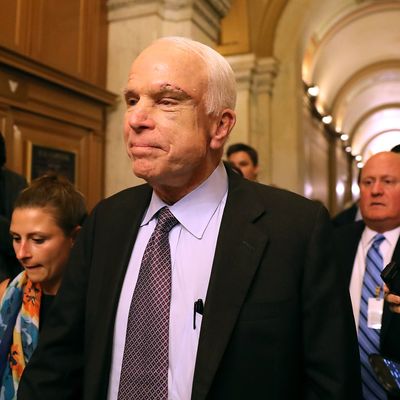
Given the storybook drama of the 2 a.m. Senate vote that was the latest coda in the GOP’s quest to repeal and/or replace Obamacare, it’s not surprising that people are casting about for heroes and villains. Many people have become fixated on the three Republican heroes — or traitors, depending on your point of view — who broke with their party to deal the death blow. Donald Trump certainly called them out. And the opinion editor of the right-wing Washington Times got personal with John McCain, the surprise “no” voter:
McCain’s vote is no doubt a sigh of relief for him.
He can spend his dying days in open friendship with the Democrats he so loves.
No more hiding in the shadows. No more feigning Republican. No more pretending to support the conservative cause.
I’m sure Republicans were even more venomous about the Maverick privately.
But let’s not get carried away with what McCain really accomplished, whether you view him as hero or villain. Consider the trajectory of events had he gone the other way.
Yes, Vice-President Pence would have broken the 50-50 tie, and the “skinny repeal” would have replaced the House-passed American Health Care Act as the underlying bill on the Senate floor. Several hours later, following the windy ritual of the “vote-a-rama,” the Senate would have almost certainly passed the Health Care Freedom Act (“skinny repeal’s” skinny title) by the same 50-50-with-a-tiebreaker vote.
Then what? Well, one possibility is that the House Speaker Paul Ryan would have made good on his promise to send the bill to a conference committee. There, some sort of repeal-and-replace legislation similar to the discarded House (AHCA) and Senate (BCRA) bills would be hammered out. Then, the conference report would return to both chambers, be ratified, and sent up to the White House for Trump’s eager signature.
But, even if you buy the idea that a little more time and a little more negotiation was all that separated congressional Republicans from a consensus bill that eluded them all year, there would have been the unavoidable problem of rulings by the Senate parliamentarian. Her ability to make various provisions of a repeal-and-replace bill unpassable would not have been diminished by passage of a “skinny repeal.” Yes, perhaps clever draftsmanship could have resolved some of the problems. But it is clear that there would have been no way to undertake the repeal of Obamacare insurance regulations that conservatives demanded without running afoul of the budget rules, and thus eliminating the ability to pass legislation with a simple majority. It didn’t get much attention in all of this week’s hysteria, but the parliamentarian added the state waivers of Obamacare’s essential-health-benefit requirements to her list of items that didn’t meet budget rules. Without this, AHCA would have never passed the House.
Since there’s no reason to doubt Mitch McConnell’s repeated and adamant statements that he would not countenance blowing up the Senate by overruling the parliamentarian by fiat, the odds are very high that any “new” version of Trumpcare would either fail to attract majority support in both Houses or fall to the parliamentarian’s red pencil.
So if that possibility is foreclosed, there’s another alternative in this imaginary future we’ve concocted: What if the Senate had passed the skinny repeal and the House double-crossed those senators begging Paul Ryan not to let it become law? Well, for one thing, given the complaints about skinny repeal from House conservatives, it’s unclear if Ryan would have had the votes to pass it, even if he was determined to screw over unhappy senators and avoid a conference. It’s also not 100 percent clear if Trump would have signed the skinny repeal, depending on who tried to explain it to him.
But even if the skinny repeal had become law, it would have left the entire regulatory structure of Obamacare in place, along with most of its taxes and all of its Medicaid expansion authority (and without the Medicaid per capita cap that was in all of the repeal-and-replace bills). It would have been a hollow victory at best for Obamacare-hating Republicans — and one they might have had to reverse if the CBO’s assessment of its impact on coverage and premiums turned out to be accurate.
In the end, none of the three Senate apostates can be blamed individually or collectively for the basic political and substantive problems with every GOP bill dealing with Obamacare. Had any of them gone the other way last night, Republicans would have probably wasted a lot of time reaching the same end point, with even more frustration, finger-pointing, and damage to their reputation of competence than they are suffering from now.
Let’s hope as they call McCain, Collins, and Murkowski RINO traitors, some congressional Republicans have the good sense and decency to privately thank them for saving the GOP from a Pyrrhic victory. Pretending viable health-care law was just around the corner until John McCain gave it a thumbs-down would represent a delusion from which the GOP’s legislative aspirations might never fully recover.






























